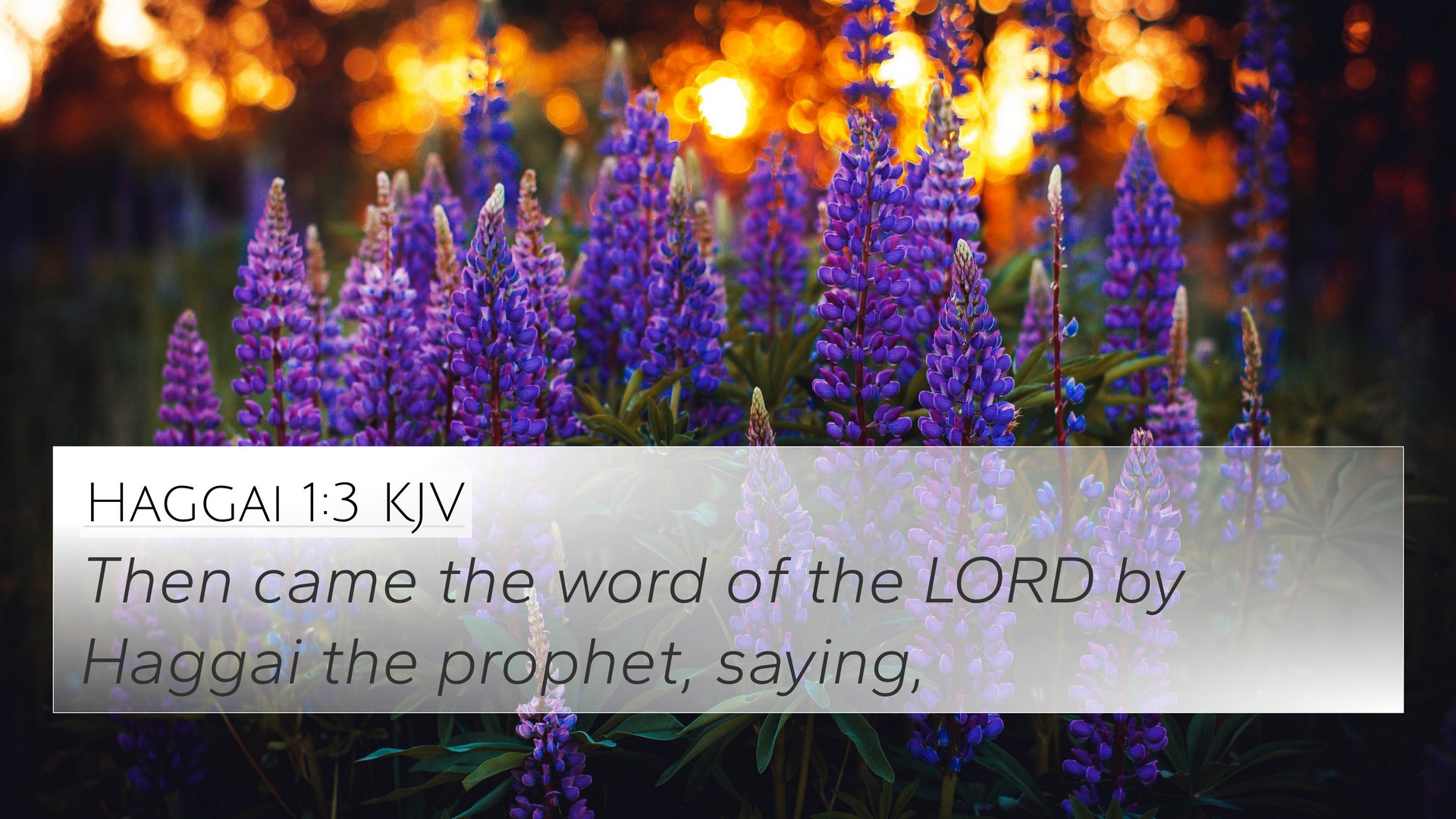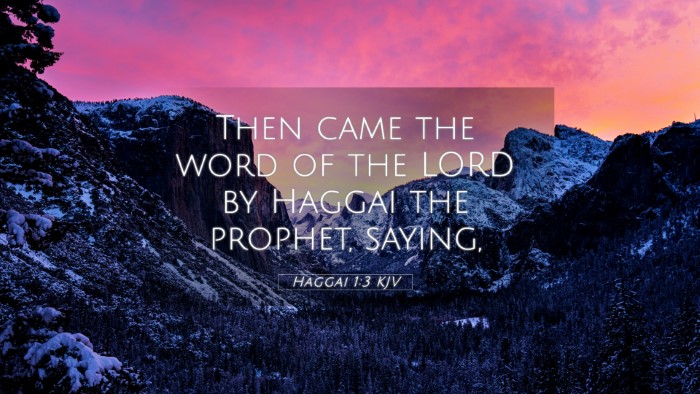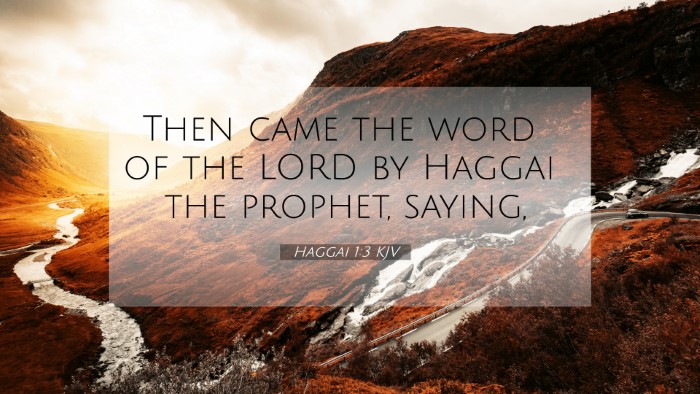Old Testament
Genesis Exodus Leviticus Numbers Deuteronomy Joshua Judges Ruth 1 Samuel 2 Samuel 1 Kings 2 Kings 1 Chronicles 2 Chronicles Ezra Nehemiah Esther Job Psalms Proverbs Ecclesiastes Song of Solomon Isaiah Jeremiah Lamentations Ezekiel Daniel Hosea Joel Amos Obadiah Jonah Micah Nahum Habakkuk Zephaniah Haggai Zechariah MalachiHaggai 1:3 Similar Verses
Haggai 1:3 Cross References
Then came the word of the LORD by Haggai the prophet, saying,
Uncover the Rich Themes and Topics of This Bible Verse
Listed below are the Bible themes associated with Haggai 1:3. We invite you to explore each theme to gain deeper insights into the Scriptures.
Haggai 1:3 Cross Reference Verses
This section features a detailed cross-reference designed to enrich your understanding of the Scriptures. Below, you will find carefully selected verses that echo the themes and teachings related to Haggai 1:3 KJV. Click on any image to explore detailed analyses of related Bible verses and uncover deeper theological insights.
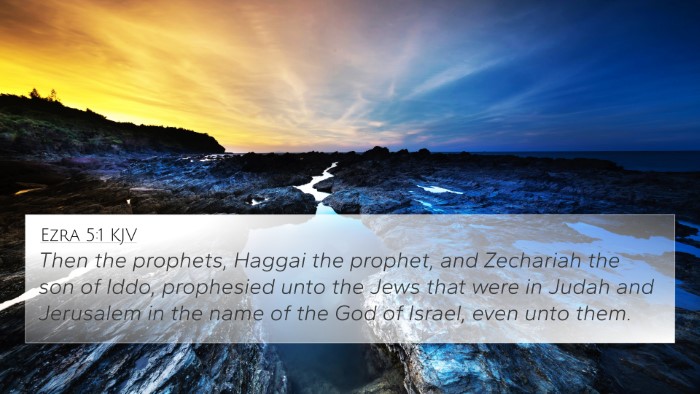
Ezra 5:1 (KJV) »
Then the prophets, Haggai the prophet, and Zechariah the son of Iddo, prophesied unto the Jews that were in Judah and Jerusalem in the name of the God of Israel, even unto them.
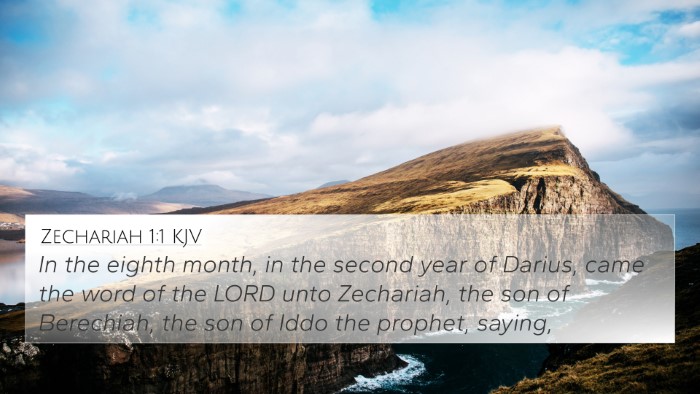
Zechariah 1:1 (KJV) »
In the eighth month, in the second year of Darius, came the word of the LORD unto Zechariah, the son of Berechiah, the son of Iddo the prophet, saying,
Haggai 1:3 Verse Analysis and Similar Verses
Understanding Haggai 1:3
Verse Text: Haggai 1:3 - "Then came the word of the Lord by Haggai the prophet, saying,"
Overview of Haggai 1:3
This verse marks the onset of Haggai's prophetic ministry, highlighting the importance of God's message delivered through him. The context reveals the spiritual condition of the Israelites post-exile and their neglect in rebuilding the temple of the Lord.
Meanings from Public Domain Commentaries
Matthew Henry's Commentary
Matthew Henry emphasizes that the declaration "came by Haggai" asserts the authority of God's word through His prophet. It reflects God's initiative in addressing His people's disobedience and apathy towards rebuilding the temple. The Lord’s communication through Haggai underlines that He is concerned about His house and encourages the people to take action.
Albert Barnes' Notes
Albert Barnes notes that the prophet’s role is critical as he is the vessel through which God conveys His grievances. The word "Lord" here signifies the covenant relationship, reminding the people of their obligations to God. Barnes highlights the timely nature of Haggai's message—addressing the neglect of spiritual priorities amidst material concerns.
Adam Clarke's Commentary
Adam Clarke elaborates on the historical backdrop of this verse, explaining that the Israelites were more focused on their own houses while neglecting the temple. Clarke underscores the urgency and seriousness of the message given through Haggai, suggesting it serves as a wake-up call to the community to realign their priorities toward fulfilling God’s will.
Cross-References with Haggai 1:3
- Jeremiah 7:1-2: Proclaims the message from God to the people concerning their practices.
- Zechariah 1:1-4: Highlights God’s call to return to Him reflecting similar themes in prophetic literature.
- Malachi 1:1: Another prophetic word given to Israel, echoing Haggai’s call for repentance.
- Ezra 5:1-2: Discusses the actions of prophets Haggai and Zechariah in urging the rebuilding of the temple.
- Isaiah 48:12-13: Addresses God’s sovereignty and purpose in the midst of Israel’s distractions.
- 1 Peter 2:5: Mentions believers as living stones being built up into a spiritual house, akin to the temple rebuilding theme.
- Matthew 21:13: Jesus references the temple, which reflects the reverence for God's house even in the New Testament context.
- 1 Corinthians 6:19: Emphasizes the body as a temple of the Holy Spirit, connecting the theme of divine dwelling.
- Hebrews 3:6: Compares the faithfulness of Christ over the house of God, suggesting continuity in God’s relationship with His people.
- Revelation 21:3: Envisions a future where God dwells among His people, indicating the ultimate fulfillment of God's presence.
Conclusion
Haggai 1:3 serves as a pivotal point in the narrative of the Israelites’ restoration. It calls for reflection on priorities and commitment to God’s work. The cross-references complement this verse by revealing the broader scriptural narrative of God's desire for a dwelling among His people and the importance of aligning human actions with divine purposes.
Thematic Bible Verse Connections
This verse and its implications reveal essential themes such as obedience, worship, and restoration. Understanding Haggai 1:3 enhances our comprehension of the continual dialogue within the Scriptures regarding God's presence, priorities, and the community's response.
